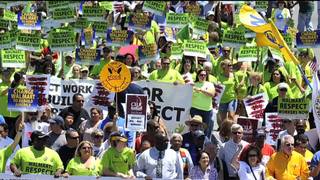
Fast-food workers walked off the job in New York City Thursday to hold a series of rallies and picket lines in what has been called the largest series of worker actions ever to hit the country’s fast-food industry. Hundreds of workers at dozens of restaurants owned by McDonald’s, Burger King, Taco Bell and others went on strike and rallied in a bid for fair pay and union recognition. Organizers with the Fast Food Forward campaign are seeking an increased pay rate of $15 an hour, about double what the minimum-wage workers are making. Workers and their allies demanded a wage that would let them support their families. Democracy Now! co-host Juan González spoke to many of the striking workers for his latest New York Daily News column, “One-day strike by fast-food workers at McDonald’s, Burger King and other restaurants is just the beginning.” [includes rush transcript]
Transcript
AMY GOODMAN: Juan, your piece in the New York Daily News today on this one-day strike by fast-food workers at McDonald’s, Burger King and others, you talk about it just being the beginning.
JUAN GONZÁLEZ: Yes, and I think the important thing to understand, as we look at this development now—because this didn’t just happen. The Service Employees International Union had hired about 40 organizers over the summer to begin developing a campaign among fast-food workers here in New York City. And they were in turn inspired by the Black Friday protest that the workers at Wal-Mart had over the past week and decided that it was time to act now, even though they were still trying to organize, to get the message out of these major companies, like McDonald’s and Burger King and Wendy’s and Domino’s, the others, Taco Bell, that—to get that message out as a means of beginning to arouse more of the workers.
And what I was struck by was the age of a lot of the workers. We’re not talking here about workers—you know, the stereotype decades ago of fast-food workers was that it was largely high school kids and college kids who were looking to be able to make some extra money. But what’s happened as a result of the Great Recession and the continual downward push on wages is that you’re finding now a lot of middle-aged and elderly people who are in these jobs. I saw a—I spoke to a 52-year-old worker who had spent 10 years working at the Off-Track Betting Corporation and, before that, at Windows on the World in the World Trade Center another 10 years. And she was at the—she said, the low point in her working life to be making minimum wage at a McDonald’s, and so that the reality is that as these older workers get pushed into these low-wage jobs, all of them have had, to some degree, union experience in the past. They understand the importance of unions, and they’re now becoming the catalyst in the fast-food industry to begin a—what could be, potentially, a huge unionization campaign.
AMY GOODMAN: And these are the jobs that can’t be shipped to China, because they’re service workers.
JUAN GONZÁLEZ: Exactly.
AMY GOODMAN: They’re serving people here.
JUAN GONZÁLEZ: Exactly. And I think that’s the—it remains to be seen whether it’s successful, but that’s how all of these huge unionized industries started, with a few organizers and a few workers understanding this great need of workers to be treated with dignity.
AMY GOODMAN: Well, of course, we’ll continue to follow this story. And you can go to our website at democracynow.org. Democracy Now! 's Martyna Starosta was out at the protest yesterday, and she'll bring you more voices from the streets outside the fast-food restaurants.












Media Options